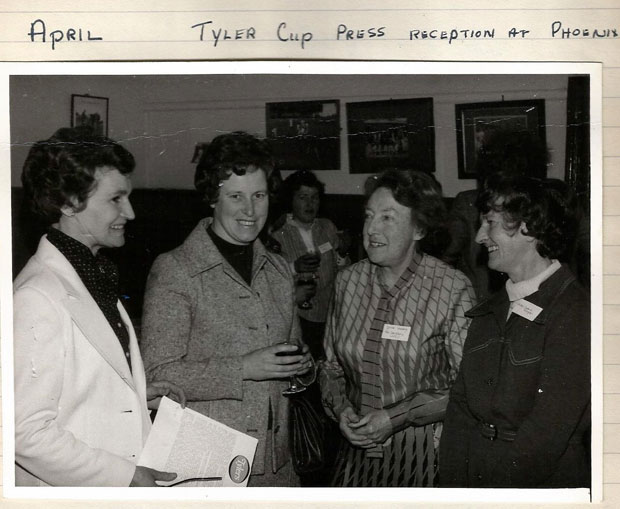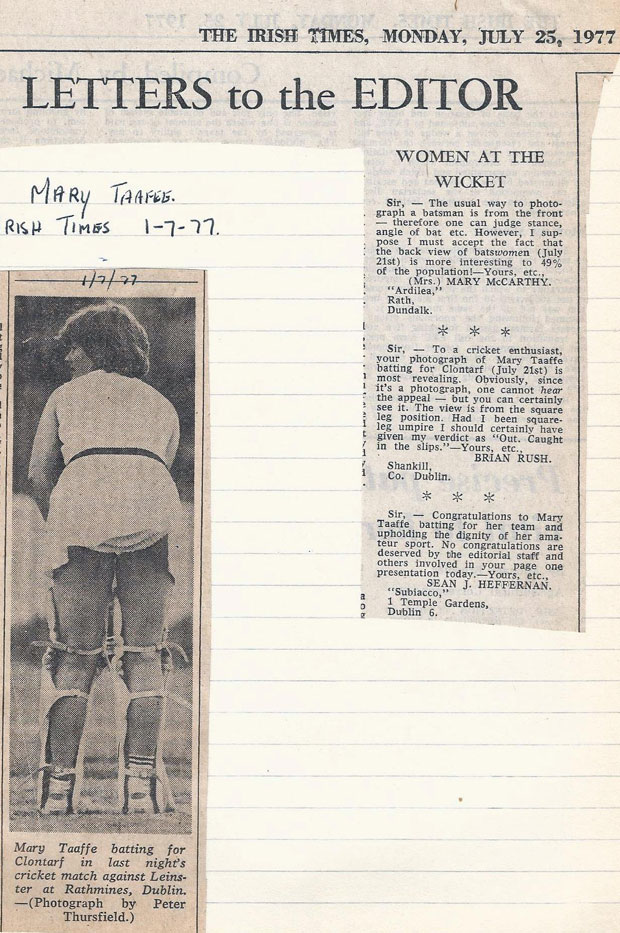There was sad news over the weekend with the death of Phyllis Spence, who is the mother of former international Adele Spence and a grandmother of current Clontarf international Freya Sargent.
Phyllis played a major role in the reintroduction of women's cricket in Leinster, and by way of tribute, we republish an article by Deryck Vincent that outlined her part in the revival.
THE GIRLS ARE BACK IN TOWN
Deryck Vincent takes a look at how the women's game was revived in Leinster, with Clontarf leading the way.
While women’s cricket flourished during the 1940s and 50s, it had died a slow death and was virtually extinct by the mid-1970s.
In 1975 Jenny Halliday and Barbara Schmidt organised a game during Trinity Week. This was the spark that reignited the game and the women of Clontarf were so inspired that they took to the game to such an extent that they dominated the early years of Leinster Women’s Cricket.
The summer of 1975 was spent organising and practising. Games against Leinster and Phoenix were arranged and a mixed friendly with the men’s team was organised in September 1975.
Over the winter, Isolde Howard, a member of Leinster CC and a woman who had been at the forefront of women’s cricket in its first incarnation in Leinster, contacted clubs to attend a meeting with a view to organising a league for the following summer.
Five clubs attended the meeting, Railway Union, Leinster, Phoenix, Merrion and Clontarf and arrangements made. In April 1976, 30 attended the Inaugural Annual General Meeting of Clontarf Cricket Club, Ladies Section and Phyllis Spence was voted in as Captain.
The 1976 season was a resounding success, with the First XI playing 8 league games and winning seven. The team was coached by Bill Dalton-Brown, Kevin Harding and Brian Bunworth and the outstanding batswoman was Susan Cassidy who scored 186 runs at 46.5. The top bowler was Marie Coffey who took 31 wickets at a remarkable 3.6.

While Marie had played for Clontarf in the 1950s, in contrast her bowling partner was the 11 year old Stella Owens whose 26 wickets only cost 4.38 runs each including a hat trick against Phoenix.
The Irish Times reported 3 games in one edition, in all cases Clontarf bowled first and dismissed Railway Union for 22, Merrion for 45 and Leinster for 37. Clontarf were not just fielding one team however and others teams played numerous friendly games including one in Mullingar.
The numbers playing were incredibly strong and evidence of this was the six a side tournament run on 10 July 1976. Clontarf fielded 6 teams in the competition, however other Leinster clubs also participated bring the total playing to 72 and the seed of an idea for an annual Leinster-wide 6 a side competition was sown.
This would become the famous, or indeed infamous, Pernod competition, famed for the après match activity.
The first running of the “Pernod” took place on 1 June 1977, an entrance fee of £3 entitled entry to the cricket competition, tea and disco afterwards and of course a sample of the sponsor’s wares.
The off season between the 76 and 77 seasons saw the new committee hard at work and in April 1977 a press conference was held to announce the inaugural Tyler Cup, a 25 over cup competition.

The work of the committee lead to an incredible amount of press coverage for the new competition and Clontarf featured heavily in this press interest. The Irish, Sunday and Evening Press newspapers carried articles and photos on Marie Coffey, Stella Owens as well as members of Leinster and Phoenix.
Press coverage is of course a double edged sword and following a photograph of Clontarf’s Mary Taaffe in The Irish Times of 1 July, the letter writers made their views known to the Editor.

Back in the regular competitions, Clontarf won the Tyler Cup, beating Phoenix. Susan Cassidy top scored with 47 not out as Clontarf made 116 for 3, however Phoenix could only manage 51 in reply as Coffey and Owens ripped through the home team batting.
In September, Clontarf had a date with Leinster in the League Final and it looked as through a straightforward double was on the cards as Clontarf reached 50 for 3 with 2 overs remaining chasing Leinster’s 52 for 6. However a Colette Brannagan hat trick caused some panic before Mary Hackett hit a boundary in the final over.
Mary finished the season with 522 runs and an extraordinary average of 174 to win the Crawford Trophy and Marie Coffey won the Harrison Trophy in taking 39 wickets at 3.7 runs each. It was Marie’s third time to win the bowling award, having won it the previous year and in 1955.
In an incredibly short time Women’s cricket had re-established itself (thanks mainly to a small and very dedicated band of organisers) and Clontarf was the club that took the lead on the field.
Others such as Leinster, Merrion and Phoenix would step up to the plate in the coming years before a new band of Clontarf women would once again dominate the sport in the 1980’s – but more of that later.
(Many thanks to Phyllis Spence for the loan of her archive which records the early days of Clontarf Ladies)